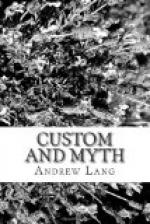There remains a third system of mythical interpretation, though Mr. Muller says only two methods are possible. The method, in this third case, is to see whether the irrational features and elements of civilised Greek myth occur also in the myths of savages who speak languages quite unlike those from whose diseases Mr. Muller derives the corruption of religion. If the same features recur, are they as much in harmony with the mental habits of savages, such as Bushmen and Hottentots, as they are out of accord with the mental habits of civilised Greeks? If this question can be answered in the affirmative, then it may be provisionally assumed that the irrational elements of savage myth are the legacy of savage modes of thought, and have survived in the religion of Greece from a time when the ancestors of the Greeks were savages. But inquirers who use this method do not in the least believe that either Greek or savage gods were, for the more part, originally real men. Both Greeks and savages have worshipped the ghosts of the dead. Both Greeks and savages assign to their gods the miraculous powers of transformation and magic, which savages also attribute to their conjurers or shamans. The mantle (if he had a mantle) of the medicine-man has fallen on the god; but Zeus, or Indra, was not once a real medicine-man. A number of factors combine in the conception of Indra, or Zeus, as either god appears in Sanskrit or Greek literature, of earlier or later date. Our school does not hold anything so absurd as that Daphne was a real girl pursued by a young man. But it has been observed that, among most savage races, metamorphoses like that of Daphne not only exist in mythology, but are believed to occur very frequently in actual life. Men and women are supposed to be capable of turning into plants (as the bamboo in Sarawak), into animals, and stones, and stars, and those metamorphoses happen as contemporary events—for example, in Samoa. {200}
When Mr. Lane was living at Cairo, and translating the ‘Arabian Nights,’ he found that the people still believed in metamorphosis. Any day, just as in the ‘Arabian Nights,’ a man might find himself turned by an enchanter into a pig or a horse. Similar beliefs, not derived from language, supply the matter of the senseless incidents in Greek myths.




